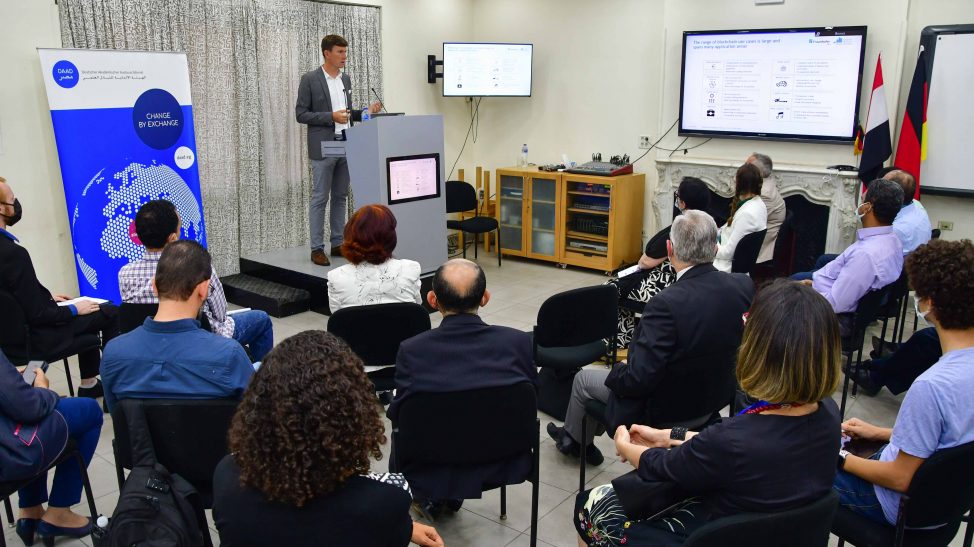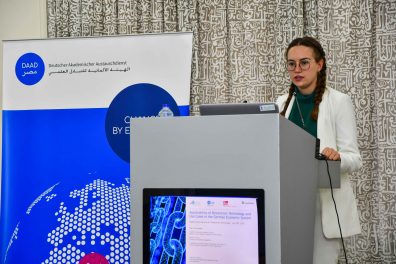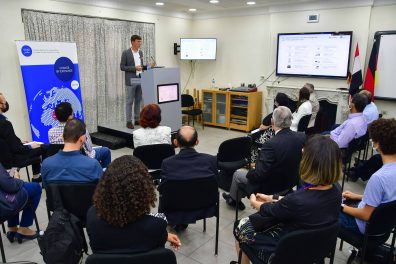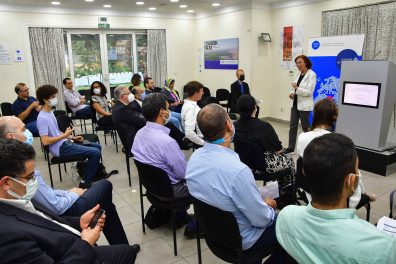Science Lecture on "Blockchain Technology"

Providing a stage for speakers from both Germany and Egypt, the Science Lecture aimed at fostering international scientific collaboration on the topic and displayed the state of development of the technology in the two countries. The interdisciplinary approach of the event combined insights into the topic from the areas of Computer Science and Economics and allowed a glimpse into other areas of application as well. The Science Lecture has given an important contribution to highlight the efforts of the German research landscape in advancing its development further; at the same time, the lecture gave insights into the state of the art of Blockchain Technology in Egypt.

Lorena Mohr© Watter al Bahry
Ms Isabell Mering, Director of the DAAD Regional Office Cairo, introduced the Science Lecture by underlining the role that blockchain can have in today’s digitalised world and by providing an outlook on the two presentations taking place in the framework of the event. Her greeting words were followed by a brief statement about her personal involvement with the topic by the Head of Science and Protocol of the German Embassy in Cairo, Ms Lorena Mohr, during her welcoming speech. Ms. Mohr explained the state of integration of Blockchain Technology in the public sphere of Germany and provided insights regarding the strategy of the Federal Government for its further implementation.

Prof. Dr Nils Urbach© Watter al Bahry
The first presentation in this year’s Science Lecture was held by Prof. Dr Nils Urbach who is a Professor of Business Informatics at Frankfurt University of Applied Sciences and Director of the Fraunhofer Blockchain-Laboratory. In his presentation “Applicability of Blockchain Technology and Use Cases in the German Economic System”, Prof. Dr Urbach outlined the general working mechanisms of blockchain and portrayed the different areas in which it is already in use as well as prospective application areas in the future. In his lecture, he described use cases that he is conducting research on such as an Open Mobility System, which combines data from various means of public transportation into a holistic journey planning engine. Another concept which is being explored by Prof. Urbach and his colleagues from the Fraunhofer Blockchain Lab is the so-called Self-Sovereign Identity: This form of digital authorisation profits from the absence of a need for a central entity providing the necessary information for the identification process. Instead of an external actor such as a bank or a governmental institution, the blockchain itself can deliver the digital fingerprint and confirms the accordance with the user.

Prof. Dr Nashwa Abdelbaki© Watter al Bahry
Prof. Dr Nashwa Abdelbaki, pProfessor of Computer Science at the School of Information Technology and Computer Science at Nile University, added to the Science Lecture by another insightful presentation in which she provided an overview over its fields of application in Egypt. By describing the legal framework in which the implementation of blockchain is situated, she gave insights into its conditions and challenges. According to Prof. Nashwa, the health sector in particular has a large potential for an effective and solution-oriented use of blockchain-based applications. Furthermore, she underlined that the development of blockchain goes hand in hand with other technologies such as the internet of things and smart cities, pointing at their interdependency and the need for a consistent development of each of them in order to find technological solutions by combining different technologies.
With the DAAD Egypt’s Science Lecture 2022 on “Blockchain Technology”, an innovative topic in science and research was successfully presented to the scientific community as well as to the interested public in Egypt. At the same time, the event served as a platform to support and foster the active and continuously growing scientific German-Egyptian network.

















